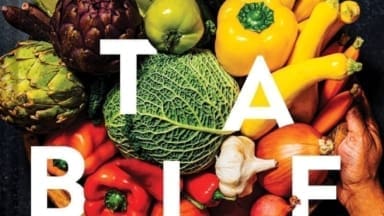
Having read, browsed and cooked his way through hundreds of books, Diacono has whittled them down to his ultimate list. The award winning writer knows a thing or two about food, he is the author of Spice (2022), Herb (2021) and Sour (2019) and hosts a monthly book club at chef Angela Harnett’s Café Murano Bermondsey.
We refer you to the full selection list, but have listed some of our favourites from Diacono’s ultimate 25.
- The re-issued classic, Roast Figs, Sugar Snow (Aster) by Diana Henry. Diacono says: “Of course, the recipes are exemplary – who doesn’t fancy tartiflette or chestnut and jerusalem artichoke soup as the nights draw in – but, as ever with Henry, the evocativeness of the writing is all but unparalleled. Everyone should own this book, and even if you have the original, this re-issue is worth it for the redesign and seven extra recipes”.
- His first book, chef Julius Roberts takes you through the year in The Farm Table (Ebury Books). “The combinations are often familiar – elderflower panna cotta with roasted strawberries and black pepper, and apricot tarte tatin – but they come with a sort of seasonal abandon that makes them so appealing”, writes Diacono.
- Underpinned by scientific insight, the recipes in Veg-Table (Chronicle Books) are inventive and ensure vegetables are the main attraction of the meal. Diacono writes “This isn’t a vegetarian book but rather vegetable-centred: over 50 recipes are organised by plant family into suites of inventive recipes that encourage us to put vegetables at the heart of our diet”.
- Where vegetables are the soul of the kitchen, Ravinder Bhogal’s Comfort and Joy (Bloomsbury) is truly engaging. “If you like the idea of modern, inventive and cross-cultural recipes, written with warmth and love, there’s no-one doing it quite like Bhogal”. writes Diacono.
- Beautifully written by the late restaurateur and author Russell Norman, Brutto: A (Simple) Florentine Cookbook (Penguin) is wonderfully uncomplicated and everything but ‘ugly’. “This – his fourth book – is as fine a monument to his brilliance as it is a reminder of what we have lost. This beautifully written book focuses on the brutto ma buono – the ugly but good – food of Florence”, explains Diacono.

